Ukraine crisis: Key players in eastern unrest
- Published
The conflict in eastern Ukraine has escalated, with the pro-Russian separatists admitting that many soldiers from Russia are helping them.
In July the devastating crash of a Malaysia Airlines jet in eastern Ukraine triggered international outrage. Western governments suspect the plane was downed by a missile fired from a rebel-held area.
Here we profile some of the key figures involved on both sides of the conflict, which erupted in April when the separatists declared independence from the revolutionary, pro-Western government in Kiev.

Alexander Zakharchenko - Donetsk rebel leader
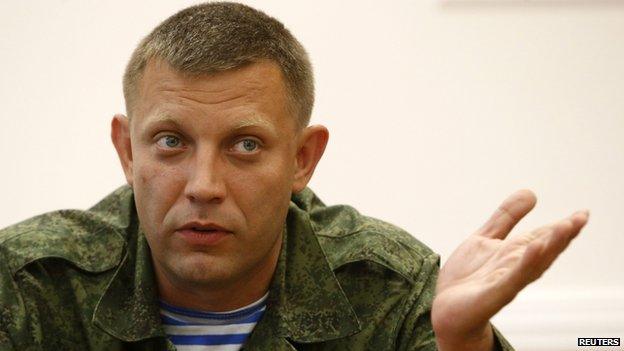
A local field commander, Mr Zakharchenko became the "prime minister" of the self-styled "Donetsk People's Republic" (DPR) in early August after his predecessor, Russian citizen Alexander Borodai, announced he was stepping down.
On 28 August Mr Zakharchenko admitted that thousands of Russian citizens, including many professional soldiers, were fighting alongside the separatists. , external
He said 3-4,000 Russians had joined the rebel ranks during the fighting and some had been killed. "Moreover, many soldiers are coming to us from Russia who prefer to spend their holidays not on the beach but shoulder-to-shoulder with their brothers, fighting for the freedom of Donbass," he said.
His predecessor, Mr Borodai, had said "I am a Muscovite - Donbass should be led by a genuine Donetsk native". He said he would stay on as first deputy prime minister.
It was seen as an effort to prove that the insurgency in eastern Ukraine was rooted locally, not orchestrated by Moscow.
Alexander Zakharchenko was born in Donetsk in 1976 and after graduating from technical school worked as a mine electrician. Russian media say that later he was a student at the law institute of Ukraine's interior ministry and also tried his hand at being a businessman.
He was head of the Donetsk branch of the militant group Oplot ("Stronghold"). The organisation was active in helping the former Ukrainian government clamp down on the pro-democracy Maidan protests in Kiev at the beginning of the year.
In May, Mr Zakharchenko was appointed rebel military commander of Donetsk and later became DPR's "deputy interior minister". Reports say that right up to becoming "prime minister" he was fighting the Ukrainian army and was wounded in the arm in late July.

Strelkov - rebel commander
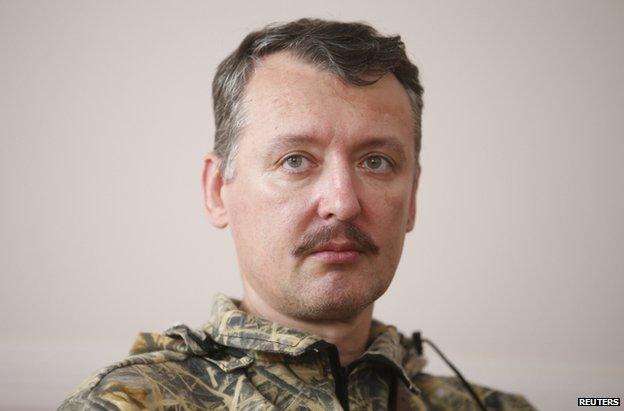
Commonly known by his nom-de-guerre Strelkov (which translates loosely from Russian as "Rifleman"), Igor Girkin has been one of the most effective rebel military commanders.
But his current whereabouts are a mystery, and it is not clear where he stands now in the rebel hierarchy. He is a Russian citizen.
With a background in the Russian military, including service in Chechnya, Serbia and Trans-Dniester, a self-proclaimed republic on the territory of Moldova, he commanded rebel forces in their symbolic stronghold of Sloviansk before retreating with his men to Donetsk. He says he was a reserve colonel in the FSB, Russia's Federal Security Service, until 31 March last year.
Until recently he was considered to be commander-in-chief of both the self-declared DPR and the "Luhansk People's Republic" (LPR). The EU believes he works for Russian military intelligence (the GRU), and has placed him under sanctions.
However, he has not been afraid to criticise Moscow, which he reproaches for failing to intervene directly in the conflict.
Shortly before news emerged that Flight MH17 had disappeared, a statement attributed to Strelkov (later deleted) appeared on Russian-language social media boasting that a Ukrainian army cargo plane had been shot down. However, the only wreckage reported on 17 July was that of the Malaysian airliner.
Strelkov, born in 1970, is said to be a military enthusiast who specialises in historical re-enactment and staged recreations of battles.

Vladimir Antyufeyev - Donetsk rebel politician
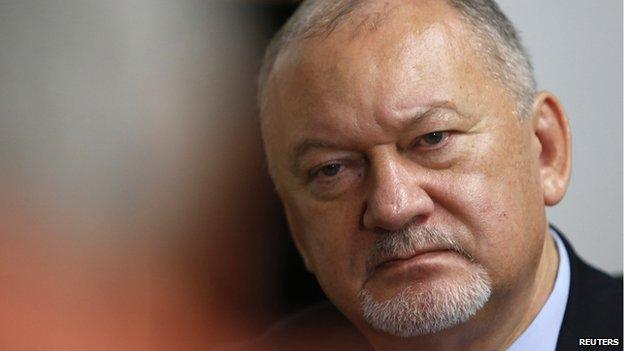
A veteran of the 1990s pro-Russian separatist rebellion in Moldova, Mr Antyufeyev emerged as DPR "deputy prime minister" in July. He is known as a staunch defender of Russian state interests in former Soviet republics.
Mr Antyufeyev was born in Russia and has spent his career in the police. He was already an officer in Soviet times.
In the late 1980s, when the Soviet Union was beginning to collapse, he led an elite police unit in Riga, Latvia, which attempted a crackdown on the Latvian independence movement.
He later resurfaced in Trans-Dniester, where he fought in the 1992 separatist revolt against Moldovan troops, and became the founder and, for two decades, the sole head of the breakaway region's powerful security ministry.
In 2012 he fell out with the new regional leaders there, who launched a criminal investigation, accusing him of abuse of power, stealing public funds and destroying sensitive evidence. He fled to Moscow and lived there until the start of the Ukraine crisis.
Like some other rebel leaders Mr Antyufeyev is now on the EU sanctions list.

Igor Bezler and Alexander Khodakovsky - Donetsk rebel commanders
Igor Bezler is a prominent commander in charge of Horlivka, a city of 300,000 people north-east of Donetsk. Born in Simferopol in Crimea, he has a Russian military background and says he has both Russian and Ukrainian citizenship. He has refused to confirm or deny serving in both Afghanistan and Chechnya.
Known as Bes (Demon), his voice was identified by Ukrainian security services in a series of phone intercepts which they say proved that MH17 had been shot down by the separatists. US officials say they have verified the calls.
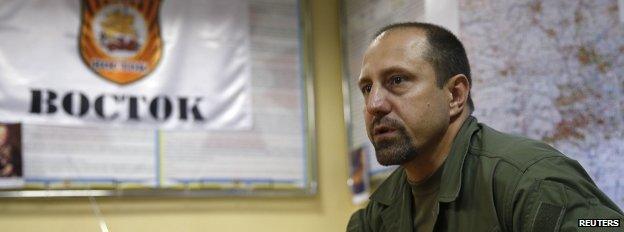
Alexander Khodakovsky is described as a defector from Ukraine's SBU
Alexander Khodakovsky is the leader of the rebel Vostok (East) battalion based in the city of Makiyivka. He is considered a defector from Ukraine's SBU security service and was once in charge of an elite counter-terrorism squad, the Alpha unit.
Phone intercepts have linked him to attempts to stop the Malaysia Airlines plane's "black box" flight recorders getting into the hands of investigators. A voice said to be his says he is acting under orders from "our high-placed friends... in Moscow".
There are reported to be tensions between Mr Khodakovsky and Strelkov., external

Pavel Gubarev - rebel figure
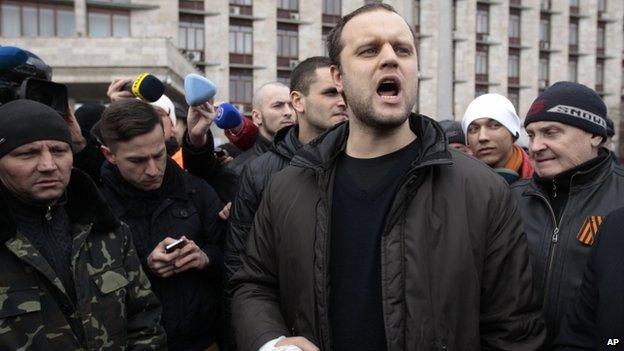
The self-styled "people's governor" of the DPR was released from custody in Kiev on 7 May in exchange for three Ukrainian security service (SBU) officers held by pro-Russian militants in Sloviansk.
He had faced charges of separatism and seizure of public buildings.
The 31-year-old founder of an advertising company is a former Donetsk district council member from the fiercely pro-Russian Progressive Socialist Party of Ukraine.
He emerged from obscurity soon after the toppling of President Viktor Yanukovych in February and led the occupation of the regional administration building by hundreds of pro-Russian activists.

Ihor Kolomoisky - Dnipropetrovsk governor
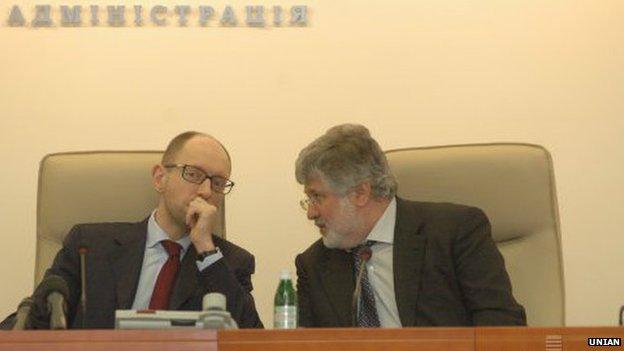
Ukrainian PM Arseniy Yatsenyuk (left) and Ihor Kolomoisky
One of Ukraine's richest oligarchs has been in charge of the eastern Dnipropetrovsk region since March.
Despite the initial controversy surrounding the appointment, the 51-year-old is now widely credited with keeping the region with a large Russian-speaking population stable and largely violence-free.
Mr Kolomoisky, a Jewish community leader in Ukraine, finances the National Defence Force, a militia fighting to keep Dnipropetrovsk region under Ukrainian control, Reuters news agency reports., external It operates in alliance with the Ukrainian armed forces.
He famously offered a $10,000 bounty to anyone who captured any Russian soldier on Ukrainian soil. He also promised to pay $1,000 for each machine-gun handed over to the authorities.
In addition, Mr Kolomoisky offered - and on at least one occasion paid - significant financial rewards to Ukrainian troops who had successfully repelled attacks by separatists.
In retaliation, pro-Russian militants in the neighbouring Donetsk region have attacked and ransacked branches of PrivatBank, which are owned by Mr Kolomoisky.
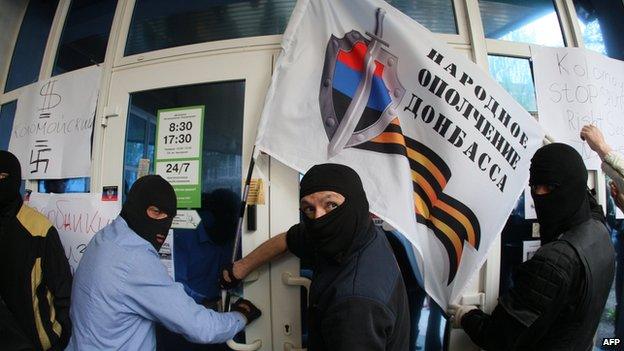
In April pro-Russian militants in Donetsk attacked branches of Mr Kolomoisky's PrivatBank

Rinat Akhmetov - Ukraine's richest person
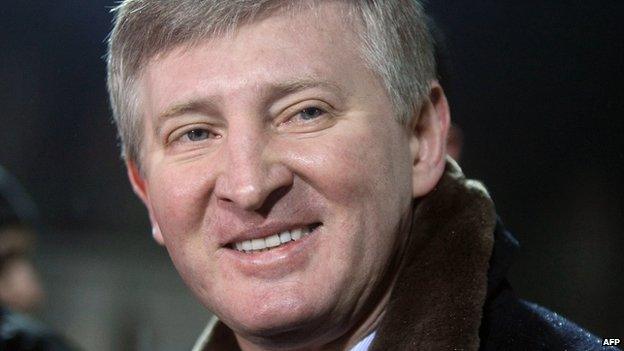
After months apparently sitting on the fence, he threw his considerable resources behind a united Ukraine and against the separatists, who he says are threatening a "genocide".
The 47-year-old, whose fortune is estimated at more than $11bn (£6.5bn), is one of the most influential people in the Donbass - a historical region including the Donetsk and Luhansk regions - where the insurgency is at its peak.
He has as many as 300,000 people employed in his coal and steel enterprises across the region, according to Reuters news agency, and it is this workforce which he has shown he is willing to use as leverage.
He called on his workers to lead the resistance to the separatists, by staging peaceful rallies daily. Rebels were driven back in the southern city of Mariupol as a result.
Mr Akhmetov's allegiance had previously been unclear, since he was a close confidant of former President Yanukovych, and has business links with Russia.

Serhiy Taruta - Donetsk governor
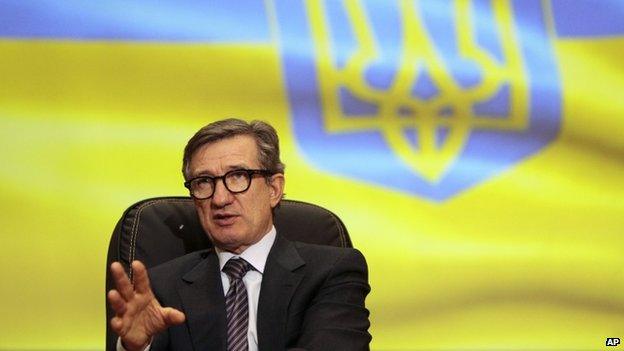
One of the Ukrainian government's key figures in the east, he was appointed governor of the Donetsk region in order to assert its authority and quell the protests in the area.
He claims he never wanted to be a state governor. He is one of the founders of the transnational metallurgical corporation ISD.
Forbes Ukraine lists him among the wealthiest citizens of the country, estimating his fortune at $697m (£415m; 500m euros).
He says ousted President Yanukovych and his close allies, who fled the country in February, are playing a crucial role in the separatist unrest in eastern Ukraine.
BBC Monitoring contributed material to this guide.BBC Monitoring, external reports and analyses news from TV, radio, web and print media around the world.